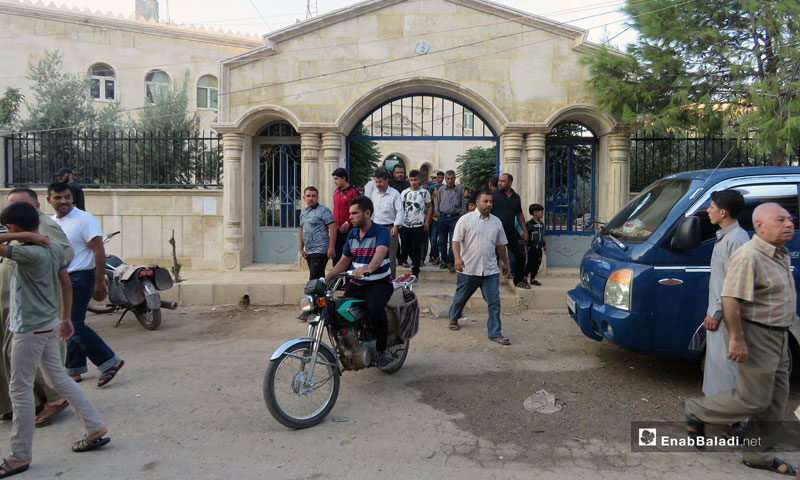Despite the siege and the war, the young woman Inass al-Hussein persisted on pursuing her university education in eastern Ghouta, keeping in mind all the difficulties. With the settlement deals that the area’s factions concluded with the Syrian regime, Inass and many others were displaced to the city of Afrin, where she started an arduous journey of education, all over again, since the city lacks official universities.
Unlike her peers, from eastern Ghouta and displaced to Afrin, Inass was lucky, as she was able to transfer her university documents from Ghouta to Afrin, despite the obstacles. She, then, joined the Free Aleppo University in the city of Azaz, not in Afrin.
Inass studies in the Teachers Preparation Institute, the Department of Mathematics, under the Free Aleppo University.
She studied under the same university’s branch in eastern Ghouta, prior to the displacement wave in April 2018.
“After too much pain and the journey of obtaining documents and transcripts, [I] managed to enroll in the university in the city of Azaz, as the university does not have a branch in Afrin,” Inass told Enab Baladi.
Inass, today, must travel from Afrin to Azaz every week, either to attended classes or to undergo exams.
Despite her suffering, Inass’ conditions are much better than those of the young man Mohammad al-Khouli, one of eastern Ghouta’s people who has been displaced to Afrin, the city which lacks an official and recognized a university that meets the needs of the youths who ended high school.
Mohammad used to study at Free Aleppo University/Eastern Ghouta Branch, but due to losing his registration documents during the displacement process, he failed to join the university once again, holding the university’s administration accountable, as it is the side supposed to transfer the documents to its principal branch in the city of Azaz, according to what he told Enab Baladi.
The absence of official universities has led the youths in Afrin to resort to distance learning, where the Diaa Moroccan Private University has opened a registration center in Afrin. Students get lectured through the internet and do exams at the center. Today, 87 students of diverse specialties are studying at the university, as monitored by Enab Baladi’s correspondent for Afrin.
Osman Mohammad, a media student, at the Diaa University told Enab Baladi that he could not continue his education due to the war, adding that he was waiting for a Turkish university to be opened in Afrin. However, he waited for a long time and then decided to enroll in Diaa University. He stressed the economic burden and fears that the university might not be recognized in the future.
Awaiting Turkish Promises
In mid-February, news spread through social networking sites, that a branch of a Turkish public university is to be opened in the city of Afrin next year, meeting the promises made by the Turkish side to the local council in Afrin.
But Mohammad al-Shaikh Rashid, a member of the Executive Committee of the local council, told Enab Baladi that the agreement on the opening of a Turkish university had not been made official and is yet within the context of unofficial promises, stressing that the education office, affiliated with the local council, is seeking to realize this.
Sheikh Rashid spoke of the suffering of the young people in Afrin, as they are unable to pursue a university education, pointing out that some of them have to go to northern rural Aleppo to study, and others are seeking scholarships in Turkey, while many remain without university education after finishing high school.
Sheikh Rashid said that the Education office of the local council is seeking to obtain free scholarships in Turkey for the youth of Afrin, although the number of students admitted during the last school year was small, no more than 20 students.
The member of the local council pointed out that the status of higher education in Afrin has been deteriorating for decades. There were no official universities during the Syrian regime’s control of the city, except for the private University of Al-Ma’moun, and there were no universities under the Kurdish control except for private unrecognized universities.
The local council is currently seeking an agreement with a Turkish university to open a branch in Afrin, facing challenges in meeting the necessary standards, including the provision of a suitable place for the university and providing a convenient building.











